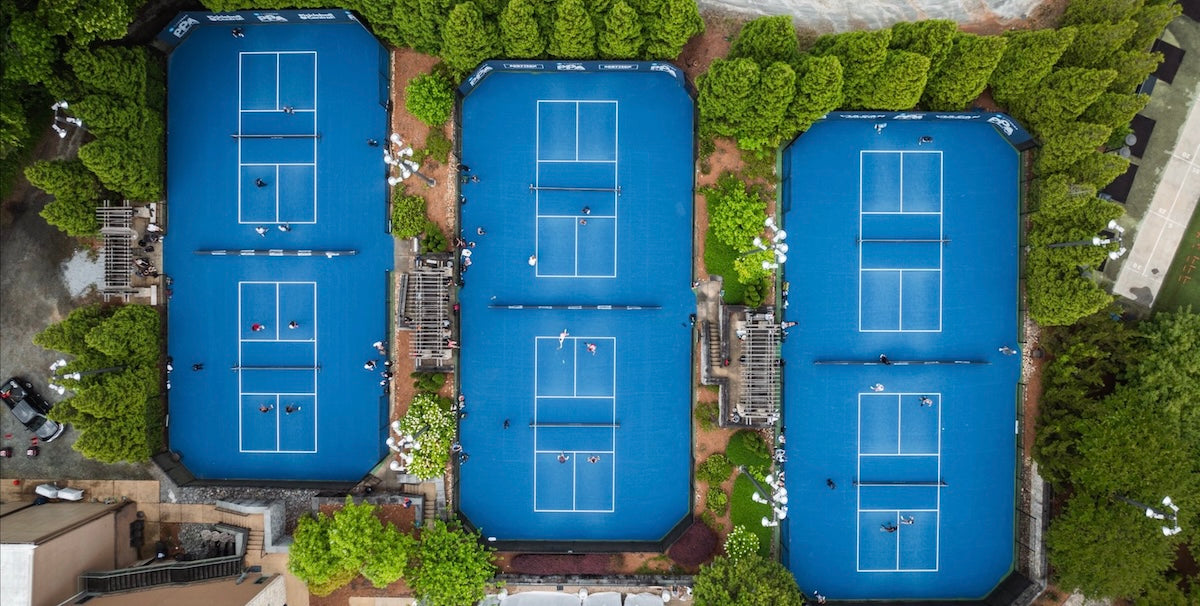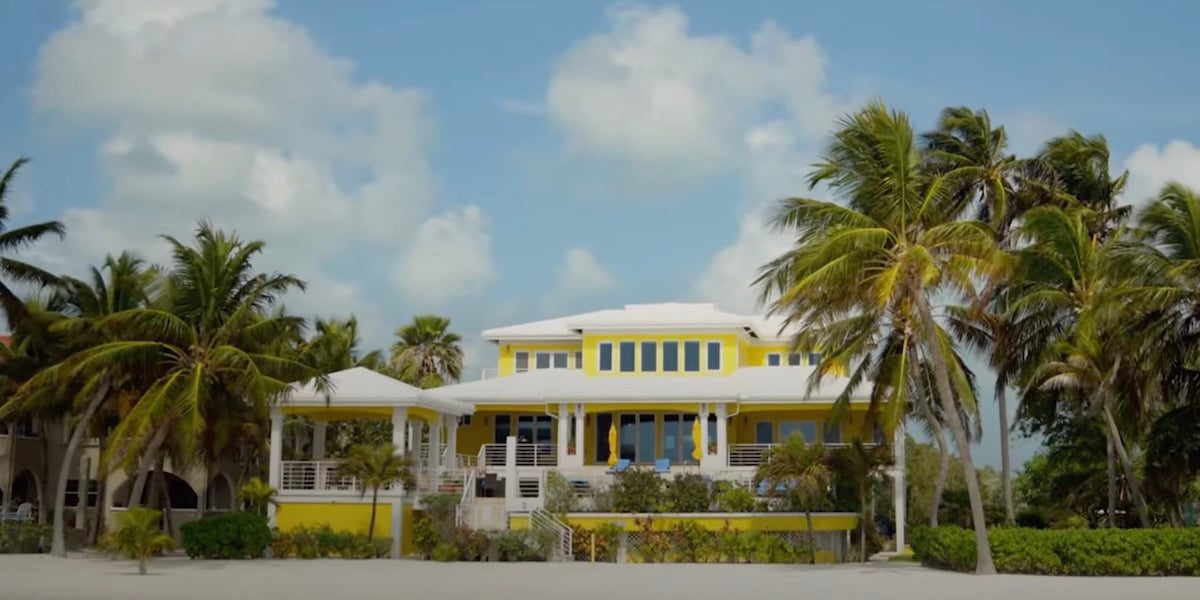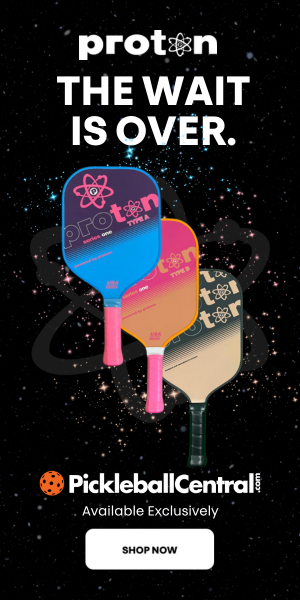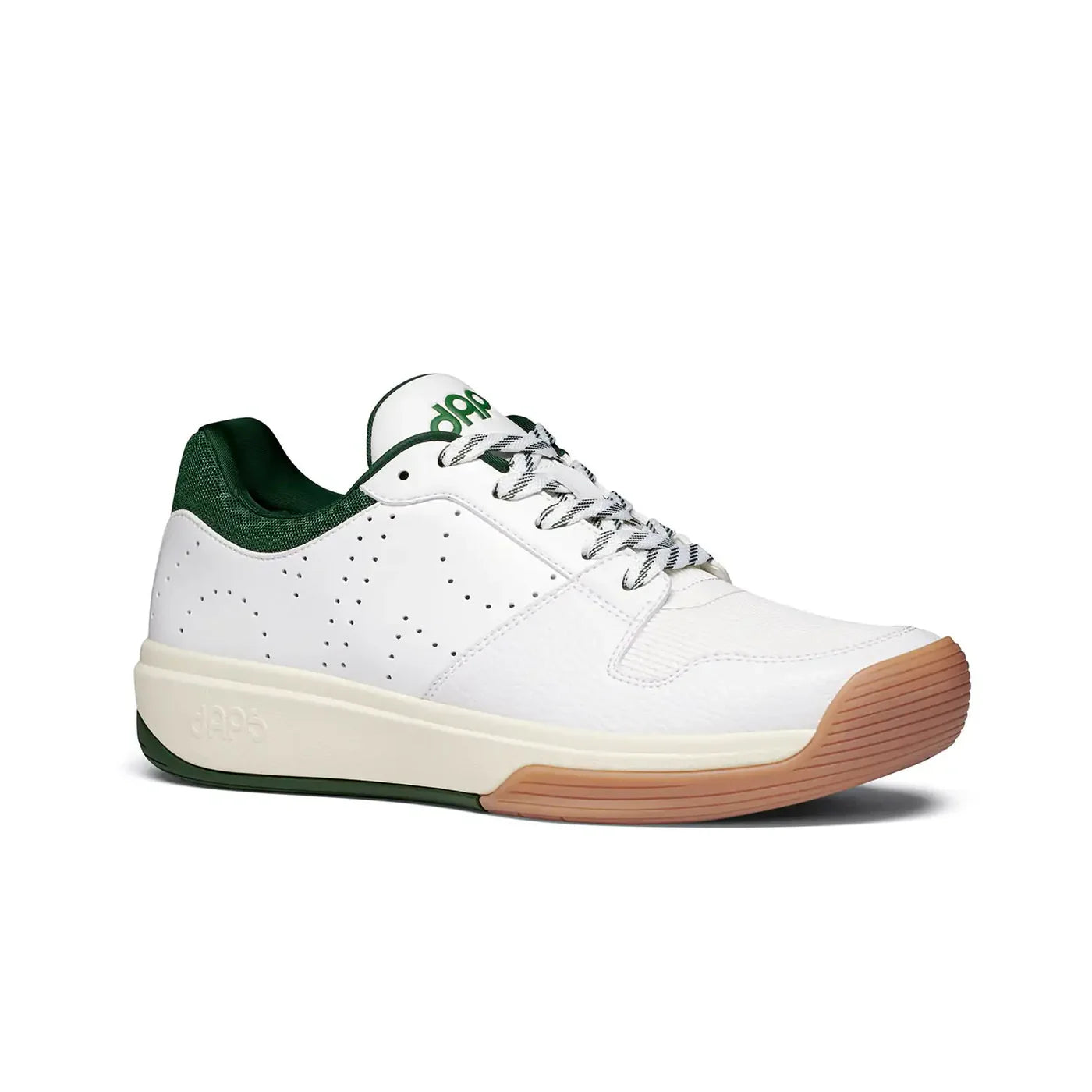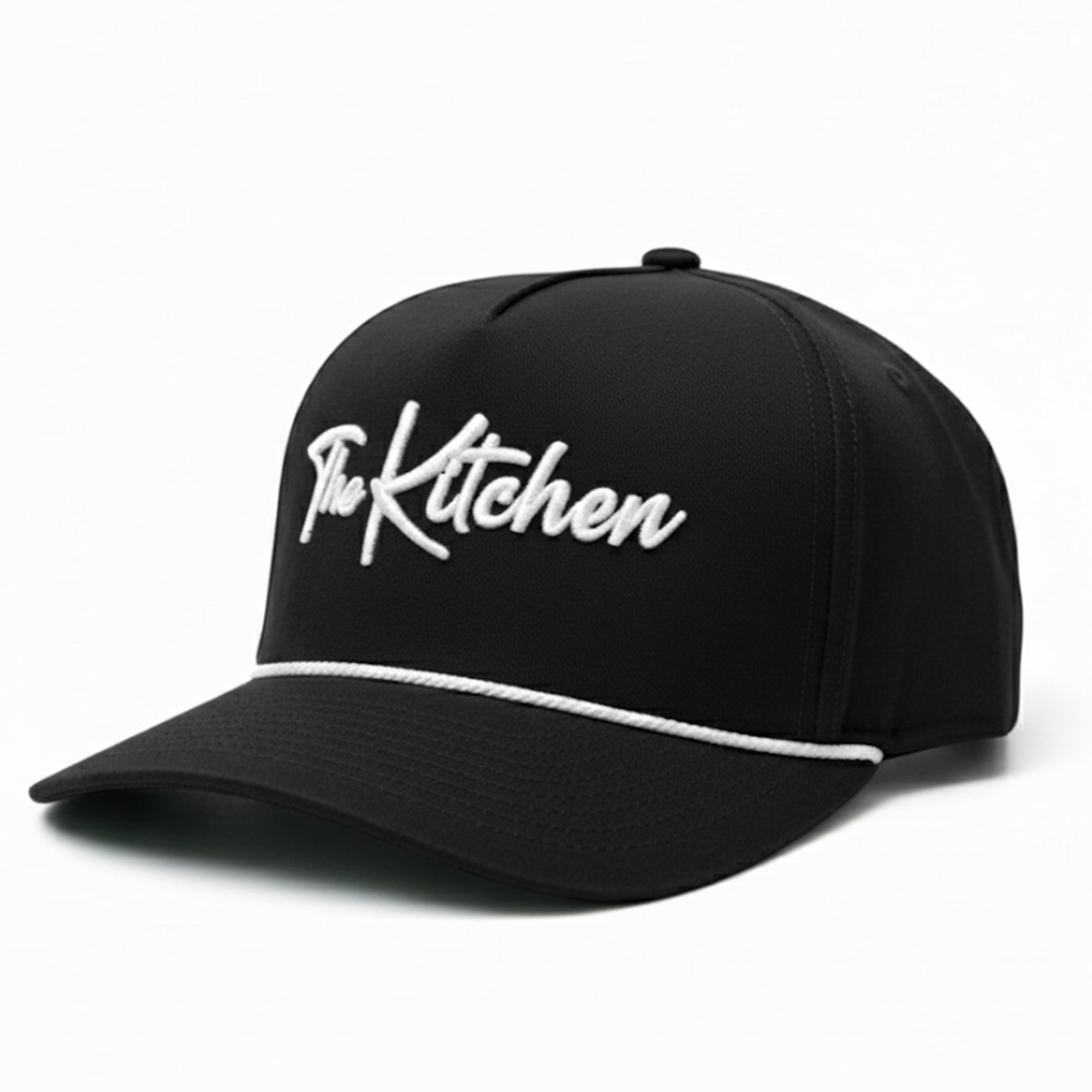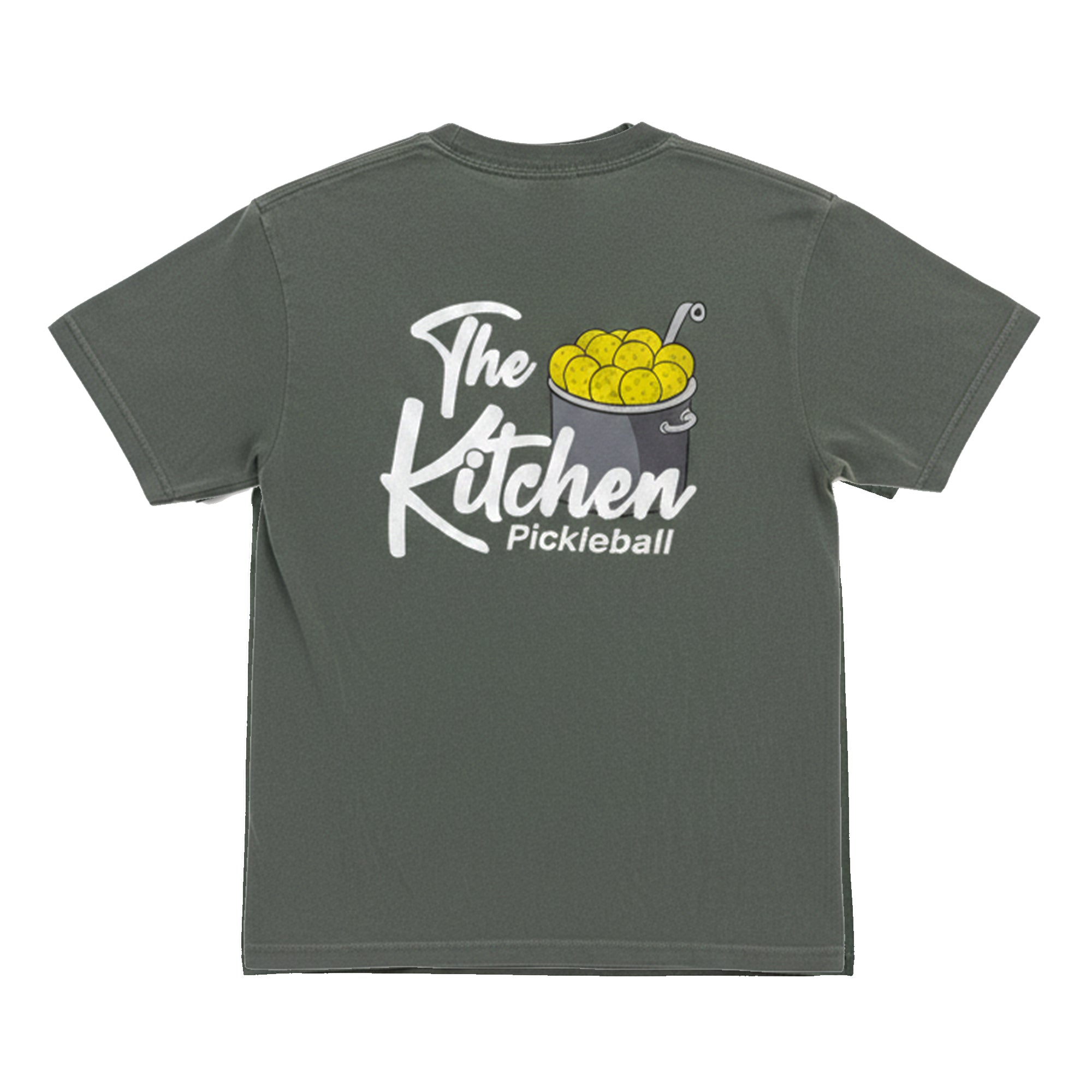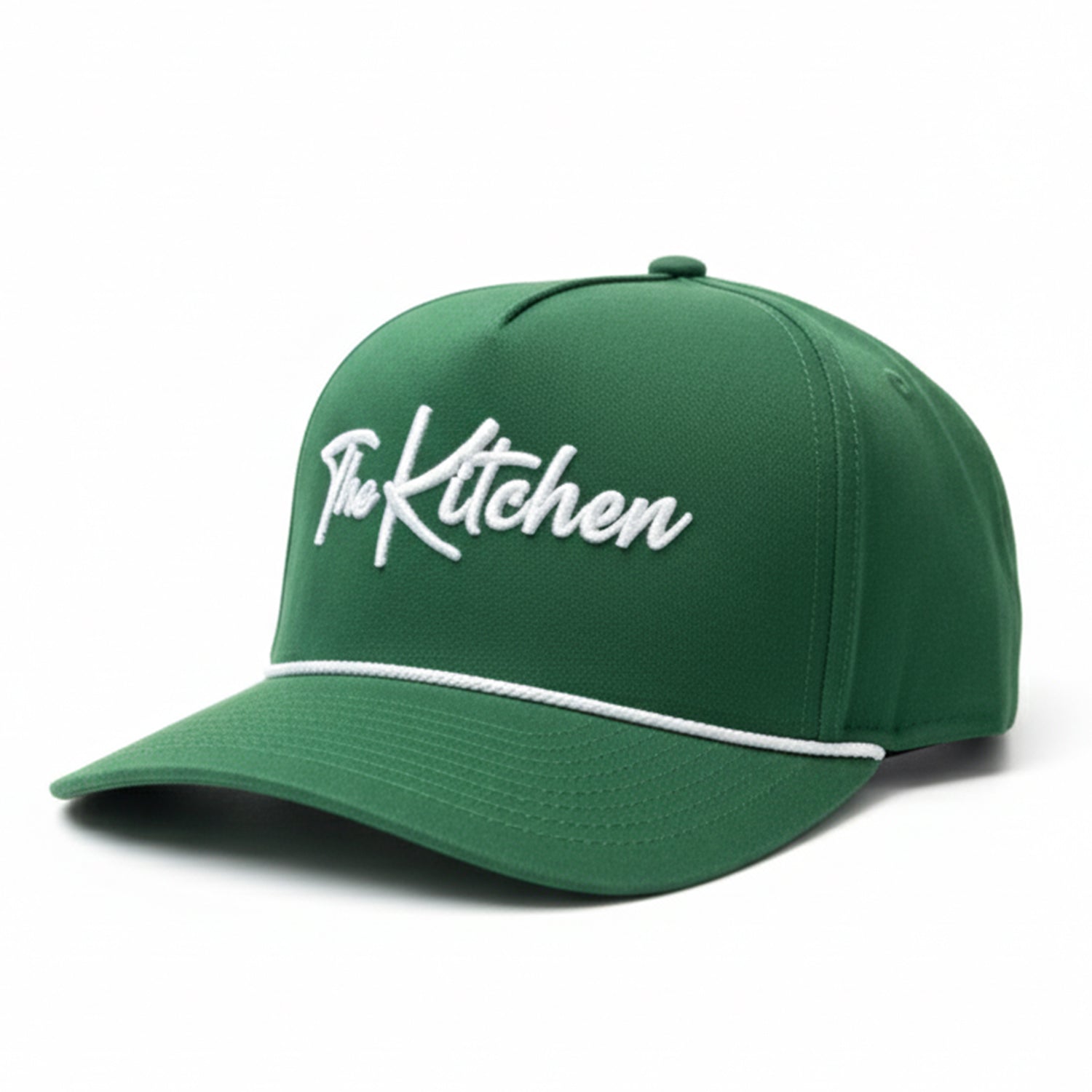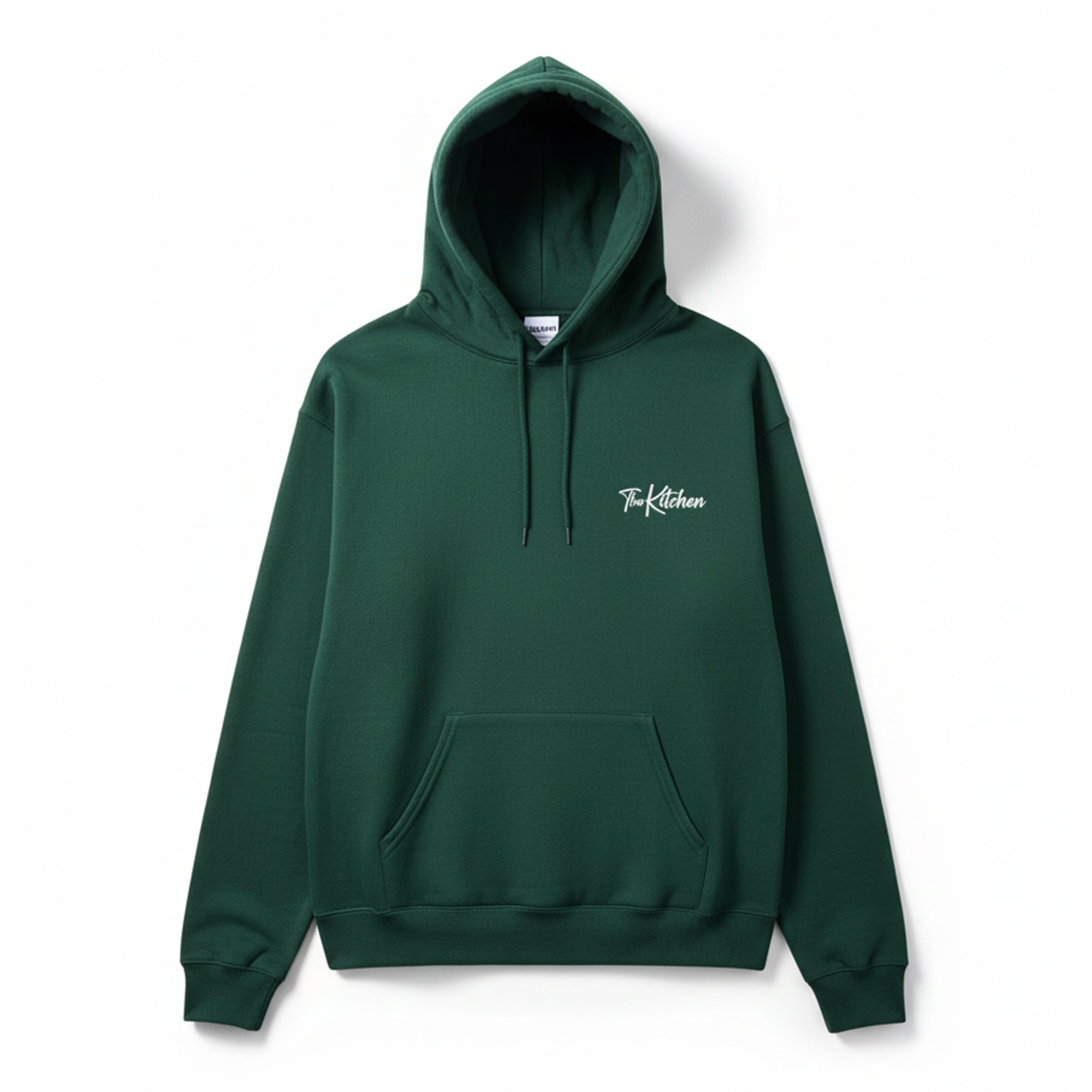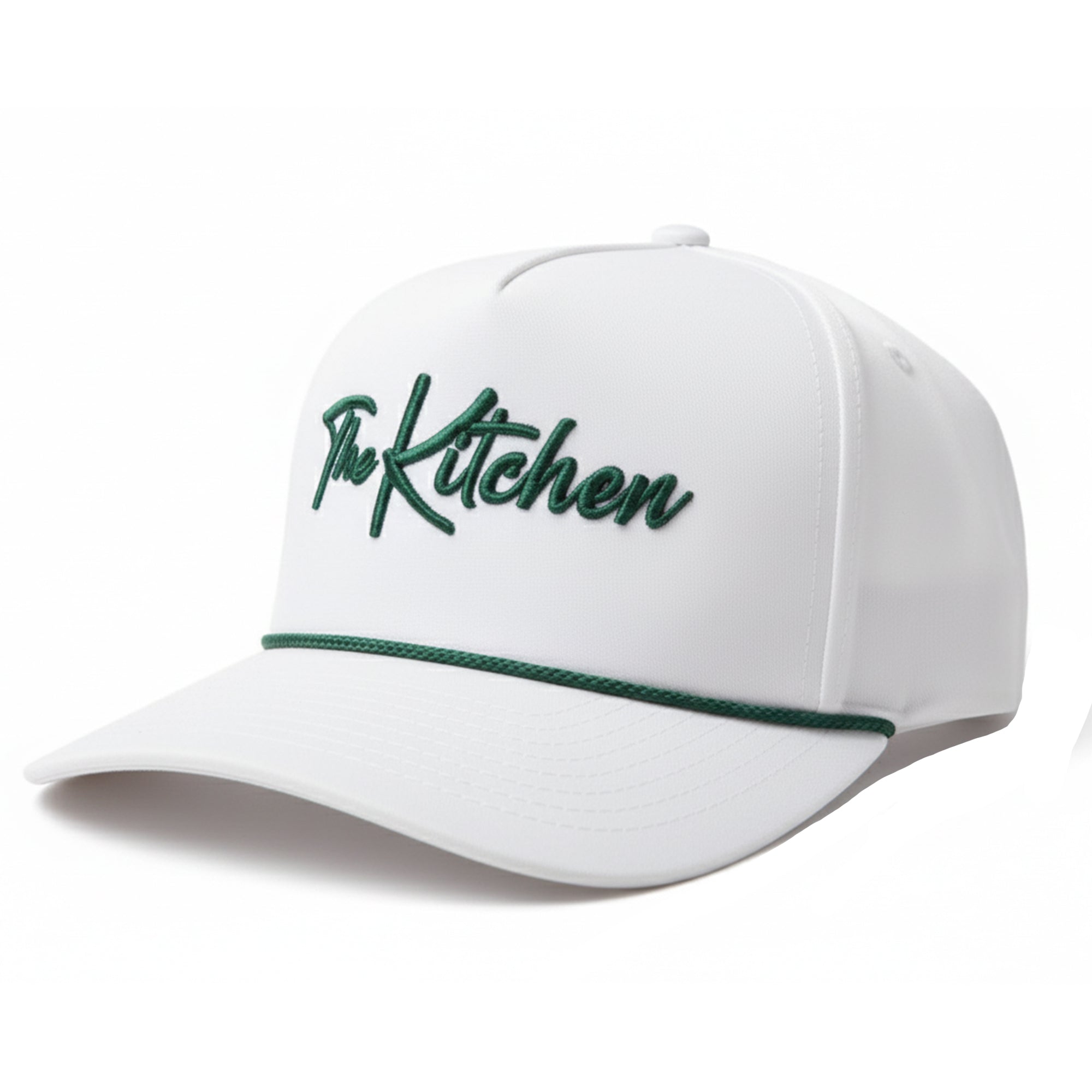Pickleball’s Gold Rush
Last Edited
Jan 20 2025
Category
Community
Pickleball is more popular than a Kardashian at an NBA afterparty. Yeah, I said it. It’s just that popular.
The sport has continued to grow year after year after year. People fall in love with this game and what’s fascinating is they do so for all different reasons. For ex-athletes it is the chance to compete again, for many it’s a chance to socialize and make friends, some people use it as their core exercise routine, and for others it is simply a new challenge or skill to learn.
But the impact pickleball has on people is quite remarkable. Not to be hyperbolic, but pickleball changes people’s lives and for some, it even saves them. I know, I know, how cliche. But it’s the truth. We hear these stories all the time in The Kitchen and it’s one of the many reasons why we love this game so much.
As the popularity of the sport continues to defy logic, thousands of new players are introduced to the sport every single day. A crazy high percentage of these new players instantly become enamored. They want to learn about it, understand where it came from, how to improve, where to play, what paddle they should buy, and a thousand other questions they ponder as they go to bed at night dreaming of when they will hit the courts next.
Who Cares?
Something the vast majority of these new players don’t care about are the ins and outs of what has been dubbed “The Tour Wars.” Whether or not you know your ‘Dundon’ from your ‘Kuhn,’ strap yourself in because it’s important we document just how pickleball got to this crazy place we are today.
With all the drama and infighting in professional pickleball, a broadcast network just might offer a Reality Show before they would an actual sports broadcast. But it’s important to keep in mind why we are seeing such chaos in the sport. These very successful and wealthy individuals jockeying for dominance in the space understand this is the pickleball equivalent to the gold rush. Getting this “right” in the short term is less important to their long term prosperity than getting the “rights” to build out and lead the commercialization of the sport. If pickleball continues to maintain the trajectory it is on, and all indications point to the affirmative, we are going to have a nation (and eventually a world) of pickleball players and fans.
 Image: The PPA Tour: Mesa, AZ. Credit: Sports Travel Magazine.
Image: The PPA Tour: Mesa, AZ. Credit: Sports Travel Magazine.
When critical mass is achieved, the network effect kicks into full effect. The relentless influx of new players, drawn to the courts are the beating heart of this phenomenon. Whether exposure takes place in your neighbor’s driveway, a local park, private club, company team building event, or middle school PE class, a chain reaction occurs, where exposure begets addiction.
One thing that makes pickleball such a democratic and accessible sport is the concept of ‘Open Play.” Knowing there are parks where you can play at any time without having to organize your own game or be a member of a club has fueled the growth of the game exponentially. One can only compare this to basketball’s pick-up scene in terms of accessibility. Like most participatory sports that are competitive (and yes, pickleball is competitive) players have a strong desire to improve. We are seeing a burgeoning industry of clinics, camps, and coaching as players seek the skills and strategies to improve. Infrastructure is being built all over the world to accommodate the demand. The next logical step is the professionalization of the game and with that, broadcasting a competitive product that the world will want to watch.
From the outside it might seem like the MLP and PPA merger deal is just two billionaires fighting. But in a way, the soul of the sport is up for grabs. A victor will be crowned because this has now become a zero sum game, the days of playing nice together and sharing your toys are long gone. When a victor is declared, and it’s coming soon, the influence of how the game is played at the highest levels will matriculate down to the parks, local tournaments, rec centers, and countless other places to play all over the world. So while you might not care about the professional game of pickleball at the moment, what happens next and how we got here does matter. So allow me to set the stage of how we got here and where things are headed.
Altruistic Pickleball
Let’s start with Steve Kuhn, the guy who not only saw the potential in the sport, but had the means (and when I say means, I mean money) to do something about it. I had the good fortune of meeting Kuhn three years ago before MLP had formally been introduced to the world. Steve is a frenetic bundle of energy and bursting with ideas. A boisterous manchild, with a heart of gold, brimming with enthusiasm for this sport. But you must remember, three years ago pickleball was still viewed suspiciously by the few who had even heard of the game.
 Image: Steve Kuhn and Major League Pickleball (MLP) at the NYSE. Credit: Major League Pickleball.
Image: Steve Kuhn and Major League Pickleball (MLP) at the NYSE. Credit: Major League Pickleball.
Pre-pandemic pickleball was nascent at best. Most people were oblivious to the sport’s existence and those who were aware were retirees who had found this new game to occupy their time. It was like Mahjong or Bridge with knees that had yet to be replaced. The version of the game being played at retirement centers and adult living facilities was a far cry from the game we see today.
These seniors, many of whom no longer had the stamina for golf, were the core players. Paddle technology was not really a thing, a nice cheese board would have performed better than some of the paddles being played at the time.
Back in 2015, while these seniors were monotonously dinking balls across the net to one another, Steve Kuhn saw what very few others did, potential. Kuhn had made his money as a hedge fund manager, but was also an avid poker player. He was hardwired for assessing and taking risks.
His first investment in the space was Dreamland, a sprawling plot of land south of Austin, TX in a town called Dripping Springs. He built four covered pickleball courts as well as a mini golf course. The property was built with small cabins overlooking the courts where he invited some of the best players in the world to live and train. Kuhn understood the need for players to be within close proximity of one another in order to improve not only their skills, but the game itself.
Know When to Hold ‘em
Kuhn had bore witness to the explosion of poker. Chris Moneymaker, the fortuitously named accountant who shocked the poker world back in 2003, won the World Series of Poker’s main event and changed the game forever. Moneymaker’s victory was the tipping point to poker’s rocketship-like ascendance into the mainstream.
Moneymaker had mastered his craft by playing online, a phenomenon that had yet to gain mainstream acceptance. But the ability to play multiple hands at all times of the day (and night) provided the critical mass of reps needed to compete with the best.
Kuhn had a vision for Dreamland to house the best pickleball players and allow them to hone their craft, much like the way Moneymaker did with online poker. Dekel Bar, Rob Nunnery, Vivian David, Lina Padigimaite, DJ Young, and others moved in and Kuhn’s plan was underway.
Image: Steve Kuhn opening Dreamland in Dripping Springs, TX. Credit: Dripping Springs News.
Somewhere in the deep recesses of Kuhn’s mind, there was a web of ideas around pickleball that were all connected to one another. The first of which was Dreamland, then DUPR, (originally called Dreamland Universal Player Ranking, only later to be renamed with Dynamic replacing Dreamland). DUPR provided some much needed structure, using various data points and algorithms in assessing players skill level, establishing a more competitive and fair level of play. Kuhn, who is a mathematical savant having studied game theory and statistics while at Harvard, helped in calibrating the black box calculus which would power DUPR.
Next to follow was a new spin on the professionalization of the sport. Instead of mimicking the tour of individuals in professional tennis, Kuhn believed there was huge potential in a league with a team format of play. With Dreamland and DUPR in place, Steve began seeking investors in his next idea, Major League Pickleball. Teams provided a multitude of benefits, including the ability to raise funds by selling teams. In 2021, eight teams were made available and fundraising began, teams were being offered for $100K. By the end of 2023, the value of these teams had grown 1200% to $12M. Investors poured in, from wealthy pickleball players to A-list celebrities like Tom Brady, Kate Upton, LeBron James, Brene Brown, Drew Brees, Heidi Klum, Eva Longoria, and dozens of others jumping onto the pickleball bandwagon. The press releases were fast and furious, helping to propel the sport and the league into America’s collective consciousness.
 Image: Drew Brees and Steve Kuhn. Credit: Forbes.
Image: Drew Brees and Steve Kuhn. Credit: Forbes.
Back in 2021, the PPA and APP were new and competing to establish themselves as the premiere professional tour of pickleball. But it was early days and pickleball was still seen as a hobby, playing the lottery was a more secure career choice than playing pickleball for a living. Then Major League Pickleball entered the chat. Kuhn had laid the groundwork and announced the first MLP event would be held at his home court, Dreamland. With a number of top players living onsite, participation was virtually guaranteed. Not only were players going to be paid to participate (if they were drafted), rewarded if they win, but they would also be awarded shares of the league for participating, giving them a vested interest in seeing Major League Pickleball succeed. This was a more than generous offering from Kuhn, a characteristic which would ultimately prove to be his fatal flaw.
It is important to note that APP at the time had no contracts with players, if you wanted to compete at an APP event, you were welcome to do so. The PPA had signed deals with players, ensuring top talent would play their events and in return, they would be compensated for their time. These contracts were ‘exclusive,’ but provided plenty of room for players to still participate in playing elsewhere if they chose to do so. It was normal to see Ben Johns playing APP events, which is something recent fans of the sport might not be able to wrap their heads around today.
The first MLP took place in November of 2021. And it was a resounding success, with the finals being broadcast on CBS Sports Network. The team format proved to be an interesting twist on the sport and the introduction of rally scoring moved the game along, making the viewing experience entertaining and easy to understand, especially for viewers who were not familiar with the game. Rally scoring was something Kuhn was adamant about, he believed it would be better for broadcasting, would be easier to understand for spectators, and be easier to onboard new players who might struggle with the complexities of traditional sideout scoring.
Hands Battle
As Kuhn and the MLP team were celebrating their inaugural event’s success, little did they know the CEO of PPA, Connor Pardoe, the young entrepreneur who had founded the league only the year before, was in discussions with a new investor, Tom Dundon.
Dundon, the Texas billionaire who had made his money in the automobile loans industry had also made significant investments in more consumer centric businesses like TopGolf and Carvana and was the owner of the NHL’s Carolina Hurricanes. Dundon had discovered his love for pickleball and with a more aggressive business approach, looked at rolling up strategic businesses to ensure success in the sport. Dundon’s business approach stood in stark contrast to Kuhn’s more altruistic and emotional version and we would see this play out over the next two years.
 Image: Tom Dundon at a Carolina Hurricanes hockey game. Credit: NHL.com
Image: Tom Dundon at a Carolina Hurricanes hockey game. Credit: NHL.com
 Image: Connor Pardoe, CEO/Founder of The PPA Tour. Credit: NYMag.
Image: Connor Pardoe, CEO/Founder of The PPA Tour. Credit: NYMag.
MLP had found a way to thread the needle as a ‘league’ and stay out of the competing tour business, managing to get the best 32 pickleball players in the world playing together. As Kuhn celebrated MLP’s success, he was about to learn firsthand about Dundon’s approach to business. The first sign of trouble was at the end of 2021, just weeks after MLP’s inaugural event, while everyone was still buzzing from the success, the PPA sent out new contracts to players.
These contracts were different from the previous year’s. Exclusivity clauses were tightened. In the previous PPA contracts players had 4-6 exemptions to play events outside PPA Tour stops. This version of the contract required PPA contracted players to get permission to play any non-PPA events, (presumably this included MLP). But there was little clarity as another notable detail in the contract was the incredibly tight deadline for players to make such a significant decision. Few of these players had any representation, agents weren’t a thing just yet and most of these players being offered contracts were inexperienced in dealing with such offers. The need for the players to have representation, whether agents, lawyers, managers, or even a union was apparent, but time was ticking and the vast majority of players who were made offers signed the deal.
While this caused a flurry of consternation amongst top players on the PPA Tour, these contracts, in hindsight, were less aimed at the players, and more at Kuhn and MLP. But this hardline approach, which stood in stark contrast to Kuhn's, would come to define how many players viewed the PPA. But Dundon was a man with a plan and he was just getting started. He went on a buying spree, he purchased Pickleball Central, the largest retailer in the space, then formalized his majority investment in PPA. He eventually had rolled up TopCourt, an online training platform, and both the tournament software companies with the largest followings, Pickleball Tournaments and Pickleball Brackets. In a matter of weeks, Dundon had built his own pickleball empire.
Kuhn, who’s vision for pickleball was clearly being threatened, met with Dundon at his offices in Dallas. That meeting, by all accounts, did not go well. Kuhn had lobbied for PPA contracted players to be allowed exceptions to play MLP events. Kuhn made the case that this ‘league’ was a compliment, not a competitor to PPA. Dundon rejected this premise and didn’t even consider Kuhn’s case. Dundon had strategically aligned these players, with his money for their salaries, to play the PPA Tour exclusively and he did not see any reason to provide Kuhn any concessions. This was Dundon’s zero sum approach and Kuhn, the altruist who believed his view was right for the sport, had a hard time processing this new reality. This was the start of the Tour Wars.
Good Vibes Only
With PPA players restricted to PPA events only, MLP proceeded without the top talent in the game. But because MLP is a team event, the lack of star power did not limit Kuhn’s ability to press on, with three successful events being held in 2022. MLP’s ability to weather this storm even without the top names in the game proved there was viability in the team format. It appeared Kuhn had a strong hand to play here. Then, in late 2022, Dundon played his cards just right and the PPA announced they would start their own team based league called VIBE. Whether VIBE was Dundon playing the pair of aces or was a complete bluff is still not fully understood, but MLP didn’t have a strong enough hand to call them on it and the unthinkable happened, a merger between Kuhn’s MLP and Dundon’s PPA/Vibe was struck.
Vibe, which basically consisted of some stickers and hoodies the PPA had printed up, would be retired before it ever became reality. And for this concession, MLP would part with significant equity, extend the pool of teams to 24, and give PPA ownership of four teams. In return, and most importantly, this would allow all PPA players to participate in the six agreed-upon MLP events planned for 2023.
Going All In
So at the start of 2023 it appeared as if all was good in the world of pickleball. Unlikely bedfellows, but there was optimism this was all working itself out. Dundon continued plotting his dominance of the sport through strategic partnerships and acquisitions while Kuhn grew the DUPR brand into the de facto rating system in the sport. The first half of the season went according to plan. But in the background, the deal to formally end the Tour Wars still had not been consummated, with each side placing blame on the other. Frustrated with the way he was being sidelined and knowing PPA had not locked up players with new contracts for 2024, Kuhn made his move.
On Thursday, August 26, 2023, while PPA was kicking off their tournament in Kansas City, all hell broke loose.
Jared and I happened to be in New York City that week for an event and were scheduled to have lunch with Steve Kuhn and MLP CEO Julio DePietro. We expected it to be a casual lunch, but little did we know Kuhn had begun sending very generous offers to players to make them exclusive to MLP. How this all went down is still hard to decipher, but it is clear Kuhn took a page out of Dundon’s playbook and pushed all in. Brooks Wiley, the commissioner of MLP had flown to Kansas City and was getting players signed with MLP on the spot. It was only when one of the loyal PPA players alerted Connor Pardoe to the offer they had received that Pardoe and Dundon were aware of the attempted coup. Pardoe, who was in Utah with his young family, ran to the airport without any bags or preparation, and flew to Kansas City to fight for his business.
The players, who had historically had little leverage in contracts up to this point, were all of a sudden in pole position. It was helpful that at this point, many of these players had agents and some played a pivotal role in moving blocks of players over to MLP. Outrageous numbers and guaranteed contracts were being bandied about. At first it was the top PPA contracted players getting the big money, Riley Newman, Irina Tereschenko, Anna Bright, Tyson McGuffin, and James Ignatowich all signed with MLP. But a few of the top players, including Ben Johns and Anna Leigh Waters, understanding their strong position as ‘must-have’ players, waited to hear Pardoe and Dundon’s offer.
The next few days were absolute chaos. We managed to interview Steve Kuhn at DePietro’s home in SoHo on Friday morning as he walked us through what was happening in real time. Kuhn, reverting back to his altruistic instincts, positioned the generous contracts as what was best for the players and best for the sport, including the player’s healthcare and travel costs being fully covered.
There was no doubt this was good for the players. But not all MLP owners had signed off or even been notified of the aggressive move and were caught off guard. Meanwhile, Pardoe was desperately scrambling to lock up as many players as he could sign and as fast as possible. Pardoe and PPA, while blindsided by these offers, had an advantage in Dundon being the only signoff needed to extend contracts. Pardoe managed to sign the ‘must-have,’ best two players in the world, Johns and Waters. Then followed those signing with Catherine Parenteau, Matt Wright, Lucy Kovalova, Tyler Loong, and Alyce Jones. The signings continued, but it was the signing of Dekel Bar, a long-term Kuhn loyalist and original Dreamland resident, that surprised many and seemed to give PPA new life. Next was the signing of the duo of Julian Arnold and Lauren Stratman, Arnold having been the star of 2023’s first season leading the Los Angeles Mad Drops to the championship as the MVP.
While Pardoe had done just enough to fend off the coup and make this a fight, the flurry of signings continued. MLP extended their reach beyond the number of players needed for a viable league and well beyond household names with over a hundred signings. With each contract MLP signed, the more pressure it put on owners, like a business dinner where the client orders the most expensive bottle of champagne to celebrate, knowing full well you are the one picking up the tab. The PPA countered by leaning into the world of tennis and betting the name recognition would draw tennis fans over to the world of pickleball, signing players with significant resumes like Jack Sock, Donald Young, and Genie Bouchard.
Amongst this chaos, two owners stepped in to take a significant stake of MLP with a promise of $50 million investment into the league. Jason Stein (NY Hustlers) and Al Tylus (DC Pickleball Team) jumped at the opportunity to invest, sharing the vision of the pickleball future Kuhn had laid the foundation for with MLP.
With the new money having been promised, two new voices had a say in the conversation. The spending came to an end and whether Kuhn folded or played his hand the way he had intended remains a mystery, but with the help of prominent owners like LA Mad Drops’ Zubin Mehta, DC Pickleball’s Tylus, MLP CEO DePietro, and NY Hustlers’ Stein, the two sides found their way back to the negotiating table and patched up their differences.
Instant Replay
MLP Atlanta took place to great fanfare, but the enormous salaries that had been guaranteed hung over the sport as the MLP’s financial realities were becoming clear. MLP owners, especially those who had signed up early, knew they were in for a wild ride, but they had not signed up for the price tag to match. There was a fracture amongst ownership, some sticking by the leadership and vision of Kuhn and others, including the four PPA appointed teams, who were seeking more financial responsibility with their investment. Ultimately it appeared both sides had extended their spending power well beyond what was financially viable and a merger was the only viable solution. An agreement was reached and a legally binding memorandum was signed while the lawyers worked out the details and contracts drafted.
 Image: Celebration at a Major League Pickleball event. Credit: Major League Pickleball.
Image: Celebration at a Major League Pickleball event. Credit: Major League Pickleball.
With the star studded list of investors in MLP, there was too much at stake, both financially and from the caliber of investor, to let MLP suffer from what would have been inevitable if it were simply based on revenues. But whether you were putting your money on MLP or PPA, it’s a bet on the future of pickleball. Betting that future players will turn into future fans. Fans who will watch on television, see the ads, buy the products, go to the camps, and return an investment on these big bets.
But just as things seemed to have calmed down and there was peace once again, days before MLP Dallas was to begin Kuhn called a loyal group of owners. On that call he went on to float the idea of selling four new teams. This had always been on the roadmap, but an acceleration of the plan to raise more capital would certainly not have been in line with the agreement of the pending merger. Why Kuhn even floated this idea is unclear and seems like a clear overstep, breaking whatever trust there was between the two camps. In a vote of no confidence, Tylus, who was on the MLP board, but not on the call in question, immediately resigned upon hearing the news. DePietro also resigned his role as CEO. The news spread fast and it threw another spanner in the works, eroding trust, and putting the merger in jeopardy… again.
MLP Dallas, which was held at Brookhaven Country Club in Dallas, Texas, kicked off the week before USAP and PPA’s presentation of the US National Championships. MLP once again ran smoothly with big crowds and exciting matchups. Kuhn was notably absent, but the rest of MLP leadership was there including the commissioner, Wiley.
But with all the drama and uncertainty, the rules of how teams would be selected between Premier and Challenger had changed. No longer were these leagues going to be based on merit as had been the plan starting in 2023. So with only San Clemente left for the year, and nothing consequential at stake for the teams to play for, MLP called an audible and held the season 2 playoffs, inviting only the top teams in their respective divisions to play for the championship.
Thrive on Chaos
I write this as the last days of 2023 fade away and there is still no word on the merger being either on or off. Team owners have deep pockets and the promise of $50 million from Stein and Tylus will keep the league afloat for sometime. But these MLP owners are wealthy because they are also shrewd investors. The bloated salaries that were promised as contracts went out during the battle at Kansas City would eat up a considerable chunk of this investment.
 Image: Top ranked pro Collin Johns at a PPA Tour event. Credit: Carvana PPA Tour.
Image: Top ranked pro Collin Johns at a PPA Tour event. Credit: Carvana PPA Tour.
Part of the negotiation for the merger was for DUPR, which was at one point, under the same ownership umbrella as MLP, would not be part of the merger and remains under Kuhn’s leadership. But after Nationals, Pickleball Brackets, which is owned by Dundon and is the software running a huge percentage of tournaments, stopped allowing the score data to be uploaded to DUPR, effectively cutting off DUPR’s oxygen.
Then news that the commissioner, Brooks Wiley, a long time confidant of Kuhn’s and an integral part of MLP’s success, had been fired. Then on November 28 an email went out from what was left of MLP leadership to all MLP players under contract starting in 2024. This email was strikingly reminiscent of the one from PPA back in December of 2021. The gist of the email was the contracts that had been signed were unsustainable for the league and a 40% deduction in both salary and workload was being requested in order to ensure the solvency of the league. Players were, just like in December of 2021, given an incredibly short timeframe to make a very important decision. But this time the players were more savvy, many represented by agents, and with much more on the line. One of the incentives offered in opting to take the reduction was the privilege to play on the PPA Tour. Not accepting the salary reduction would leave players out of all PPA events.
The MLP contracts, which were generous, required 200 days of work from the players per year. PPA and MLP have both announced the formation of their respective camps, which would be run by contracted players to work off these days and justify the generous wages.
Jill Braverman, one of the more outspoken players and former CEO of DUPR, spearheaded a player collective, attempting to bring the power of collective bargaining to the side of the players. It is unclear who this collective actually represents as the players, who are calling for transparency, don’t want to make their involvement in the collective public. Meanwhile, the deadline MLP had insisted upon came and went and has now seemingly been extended with a decision now having to be made January 31, 2024.
Behaving as if the merger is happening, MLP decided to determine Premier and Challenger teams through a Dutch Auction, which was essentially a fundraising. Teams bid, blind, what they were willing to pay to have a spot in the Premier. The top twelve bidders would retain the spots, paying what the lowest of the twelve teams had bid. As it turns out, the lowest bid was $400,000 and the exercise conjured up $4.8 million just like that.
Interestingly, the PPA has communicated in subsequent emails that the merger is expected to take place and with such a positive response in players agreeing to the 40% reduction, the PPA is now full of players. The email goes on to say MLP is no longer requiring players to take the pay cut, even offering some that took the cut to revert back to the original offers the MLP had made.
I have to believe a merger takes place and PPA’s leadership of Dundon and Pardoe will have a heavy hand in how MLP looks moving forward. Their ability to make PPA the clear leader as a tour and the financial acumen they have demonstrated might not be the favorite of some players, but will certainly resonate with most MLP owners cutting the checks.
So here we are. Lots of drama that the vast majority of pickleball players will never know or care about. But it is important to understand what has happened, who the players are, and why it has all played out the way it has. It’s been a wild ride and there are plenty of details that I either missed or simply couldn’t fit into this recap, but the essence is accurate to the best of my knowledge.
It is clear that Steve Kuhn will do everything in his power to do what is best for the sport and the players. Pardoe and Dundon also want what is best for the sport, but in contrast to Kuhn, will make decisions based on financial realities and look out for the long-term health of both the game and their business interests.
As we wait for the resolution of the Tour Wars, I’m just excited to be playing this amazing sport. I hope you are too. Pickle on.



 Image: Fans cheering at the PPA Tour: Texas Open. Credit: Carvana PPA Tour.
Image: Fans cheering at the PPA Tour: Texas Open. Credit: Carvana PPA Tour.
